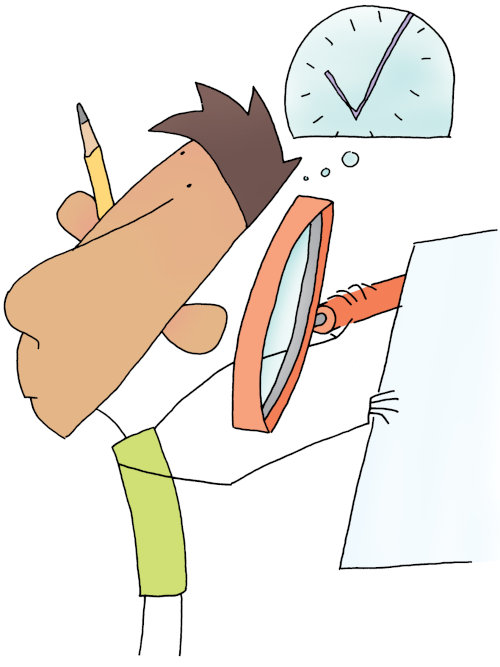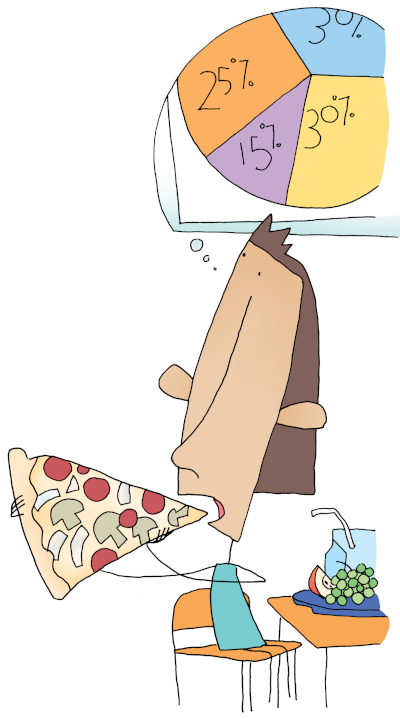WOC 496
Page 496

Editing for Mechanics
Capitalization
496.1 Proper Nouns, Adjectives
Capitalize all proper nouns and all proper adjectives. A proper noun is the name of a particular person, place, thing, or idea. A proper adjective is an adjective formed from a proper noun.
Common Noun
country, president, continent
Proper Noun
Canada, Andrew Jackson, Asia
Proper Adjective
Canadian, Jacksonian, Asian
496.2 Names of People
Capitalize the names of people and the initials or abbreviations that stand for those names.
Sharice Davids, George R. R. Martin, Timothée Chalamet, Martin Luther King, Jr., Olivia Rodrigo
496. Historical Events
Capitalize the names of historical events, documents, and periods of time.
the Iraq War, the Bill of Rights, the Magna Carta, the Middle Ages, the Stone Age
496.4 Abbreviations
Capitalize abbreviations of titles and organizations.
M.D., Ph.D., B.A., Dr., CTO (Chief Technology Officer), FBI, NJHS (National Junior Honor Society)
496.5 Organizations
Capitalize the name of an organization, an association, or a team and its members.
Big Brothers Big Sisters, the Red Cross, Natural Resources Defense Council
the Miami Dolphins, Republicans, the Democratic Party
496.6 Names of Subjects
Capitalize the name of a specific course, but not the name of a general subject. (Exception: The names of languages are proper nouns and are always capitalized—French, Hindi, German, Chinese.)
Mr. Zach is teaching a ceramics course called Cookin’ with Clay.
WOC 497

Page 497
497.1 First Words
Capitalize the first word of every sentence and the first word in a direct quotation. Do not capitalize the first word in an indirect quotation.
The astrophysicist Neil deGrasse Tyson once said, “There is no greater education than one that is self-driven.”
(sentence with direct quotation)
Tyson noted that the best education of all is self-driven.
(sentence with indirect quotation)
“We are part of this universe; we are in this universe,” he pointed out, “but perhaps more important than both of those facts, is that the universe is in us.“
(Notice that but is not capitalized because the word does not begin a new sentence.)
“Kids should be allowed to break stuff more often. That’s a consequence of exploration,” Tyson said. “Exploration is what you do when you don’t know what you’re doing.”
(Exploration is capitalized as the beginning of a new sentence.)
497.2 Capitalize Geographic Names

Planets and heavenly bodies
Earth, Jupiter, Milky Way
Continents
Europe, Asia, South America, Australia, Africa
Countries
Mexico, Haiti, Greece, Chile, United Arab Emirates
States
New Mexico, Alabama, Wyoming, Delaware, Iowa
Provinces
Alberta, British Columbia, Quebec, Ontario
Counties
Sioux County, Kandiyohi County, Wade County
Cities
Montreal, Baton Rouge, Albuquerque, Portland
Bodies of water
Delaware Bay, Chickamunga Lake, Indian Ocean
Gulf of Mexico, Skunk Creek
Landforms
Appalachian Mountains, Bitterroot Range, Death Valley
Public areas
Tiananmen Square, Sequoia National Forest, Constitution Gardens, Eiffel Tower
Statue of Liberty, Black Mountain Open Space Park, Vietnam Veterans Memorial
Roads and highways
New Jersey Turnpike, Interstate 80, Central Avenue, Chisholm Trail, Mutt’s Road
Buildings
Pentagon, Globe Theatre, Notre Dame Cathedral
WOC 498
Page 498
498.1 Particular Sections of the Country
Capitalize words that indicate particular sections of the country; do not capitalize words that indicate just a direction.
the West, the East Coast, the Deep South, the Midwest, the Far North
northern region, eastern shore, moving south, traveling west
Also capitalize proper adjectives formed from names of specific sections of a country. Such adjectives usually describe the section’s culture or experience.
Southern hospitality Northern winters Midwestern accent
498.2 Names of Languages, Races, Nationalities, Religions
Capitalize the names of languages, races, nationalities, and religions, as well as the proper adjectives formed from them.
Arab Christian tradition
Burmese African art
Spanish Irish linen
Judaism Mexican food
Capitalize words such as mother, father, aunt, and uncle when these words are used as names.
Uncle Marius started to sit in his chair.
(Uncle is part of the name “Uncle Marius.”)
But Uncle stopped in midair.
(Uncle is used as a name.)
My aunt was calling him.
(The word aunt describes her but is not used as a name.)
Then my dad and mom walked in.
(The words dad and mom are not used as names.)
“Hi, Mom. Is this a family meeting?” I asked.
(Mom acts as a name.)
Note: Words such as aunt, mom, dad, grandma, and so on, are not capitalized if they come after a possessive pronoun (my, his, our).
Capitalize the names of days of the week, months of the year, and special holidays.
Friday, Saturday July, August Independence Day, Earth Day
Note: Do not capitalize seasons: winter, spring, summer, fall.498.3 Words Used as Names
498.4 Days, Months, Holidays
WOC 499

Page 499
499.1 Official Names
Capitalize the names of businesses and the official names of their products. (These are called trade names.) Do not, however, capitalize a general descriptive word like bandage when it follows the trade name.
The Gap, Volvo, Microsoft, Levi’s jeans, Band-Aid bandage
499.2 Titles Used with Names
Capitalize titles used with names of persons and abbreviations standing for those titles.
President Xi Jinping Dr. Seuss
Gov. Katie Hobbs Mother Teresa
Senator Cory Booker Sir Ian McKellen
499.3 Titles
Capitalize the first word of a title, the last word, and every word in between except articles (a, an, the), short prepositions, and coordinating conjunctions. Follow this rule for titles of books, newspapers, magazines, poems, plays, songs, articles, movies, works of art, pictures, stories, and essays.
The Dragon and the Girl (book)
The Times of India (newspaper)
National Geographic (magazine)
“The Hill We Climb” (poem)
Hadestown (play)
“Champagne Problems” (song)
Chicken Run: Dawn of the Nugget (movie)
Boulevard of Broken Dreams (work of art)
Capitalize |
Do Not Capitalize |
American |
un-American |
January, February |
winter, spring |
the Ohio River |
the Missouri and Ohio rivers |
The South is known for its hospitality. |
Turn south at the stop sign. |
Duluth Central High School |
a Duluth high school |
Governor Josh Green, M.D. |
Josh Green, M.D., our governor |
Prime Minister Justin Trudeau |
Justin Trudeau, prime minister |
Ford Mustang GT |
a Ford automobile |
Planet Earth rotates. |
The earth was dark and fertile. |
I’m taking History 101. |
I’m taking history. |
WOC 500
Page 500
Plurals
500.1 Nouns Ending in a Consonant
The plurals of most nouns are formed by adding s to the singular.
cheerleader — cheerleaders wheel — wheels
The plural form of nouns ending in ch, sh, s, z, and x is made by adding es to the singular.
lunch — lunches dish — dishes fox — foxes
mess — messes buzz — buzzes
500.2 Nouns Ending in o
The plurals of nouns ending in o with a vowel just before the o are formed by adding s.
radio — radios studio — studios rodeo — rodeos
The plurals of most nouns ending in o with a consonant letter just before the o are formed by adding es.
echo — echoes hero — heroes tomato — tomatoes
Exception: Musical terms always form plurals by adding s.
alto — altos solo — solos piano — pianos
The plurals of nouns that end with ful are formed by adding an s at the end of the word.
three platefuls four cupfuls
The plurals of nouns that end in f or fe are formed in one of two ways: If the final f sound is still heard in the plural form of the word, simply add s; if the final sound is a v sound, change the f to ve and add s.
roof —roofs chief — chiefs (plural ends with f sound)
wife — wives loaf — loaves (plural ends with v sound)
The plurals of common nouns that end in y with a consonant letter just before the y are formed by changing the y to i and adding es.
fly — flies jalopy — jalopies
The plurals of common nouns that end in y with a vowel before the y are formed by adding only s.
donkey — donkeys monkey — monkeys
The plurals of proper nouns ending in y are formed by adding s.
There are three Best Buys in our metro area.500.3 Nouns Ending in ful
500.4 Nouns Ending in f or fe
500.5 Nouns Ending in y
WOC 501
Page 501
501.1 Compound Nouns
The plurals of some compound noun are formed by adding s or es to the main word in the compound.
brothers-in-law maids of honor secretaries of state
501.2 Irregular Spelling
Some words (including many foreign words) form a plural by taking on an irregular spelling; others are now acceptable with the commonly used s or es ending.
child — children
goose — geese
cactus — cacti or cactuses
501.3 Adding an s
The plurals of symbols, letters, numbers, and words discussed as words are formed by adding an apostrophe and an s.
#’s, &’s, $’s, +’s, =’s
p’s and q’s, MP3’s, rpm’s, Ph.D.’s
3’s, 8’s
Grandma lived into her 90’s.
Manny used a lot of cool’s and dude’s in his report.
For information on forming plural possessives, see 495.3.
Abbreviations
501.4 Abbreviations
501.4 Abbreviations
An abbreviation is the shortened form of a word or phrase. The following abbreviations are always acceptable in any writing:
Mr., Mrs., Ms., Dr., a.m., p.m. (A.M., P.M.)
B.C.E. (before the common era), C.E. (common era)
B.A., M.A., Ph.D., M.D.
Caution: Do not abbreviate the names of states, countries, months, days, or units of measure in formal writing. Also, do not use signs or symbols (%, &) in place of words.
501.5 Acronyms and Initialisms
Most abbreviations are followed by a period. Acronyms and initialisms are exceptions. An acronym is a word formed from the first (or first few) letters of words in a phrase (NASA). An initialism is the same but can’t be pronounced as a word (HDTV).
URL — uniform resource locator
WHO — World Health Organization
PBS — Public Broadcasting System
HDTV — high-definition television
NASA — National Aeronautics and Space Administration
SADD — Students Against Destructive Decisions
WOC 502
Page 502

Numbers
502.1 Numbers Under 10
502.1 Numbers Under 10
Numbers from one to nine are usually written as words; all numbers 10 and over are usually written as numerals.
two seven nine
10 25 106
You may use a combination of numerals and words for very large numbers.
1.3 million 17 billion
You may spell out large numbers that can be written as two words.
two thousand; but 2,001
Use words, not numerals, to begin a sentence.
Twenty (not 20) out of twenty-four students said they spent two or more hours online each day.
Use numerals to express money, decimals, percentages, chapters, pages, time, telephone numbers, dates, identification numbers, ZIP codes, addresses, and statistics.
$2.39 26.2 serial no. 1721AX
July 6, 1942 8 percent 44 B.C.E.
chapter 7 79 C.E. pages 287–289
a vote of 23 to 4 4:30 P.M. 34 mph
2125 Cairn Road 1-800-555-1212
If you are comparing two or more numbers in a sentence, write all of them either as numerals or as words.
Students from 9 to 14 years old are invited.
(or)
Students from nine to fourteen years old are invited.
Numbers that come before a compound modifier that includes a numeral should be written as words.
We need twelve 10-foot lengths to finish the floor.
Within the last year, Jing-Ho wrote twenty-five 12-page reports.502.2 Very Large Numbers
502.3 Sentence Beginnings
502.4 Numerals Only
502.5 Comparing Numbers
502.6 Numbers in Compound Modifiers